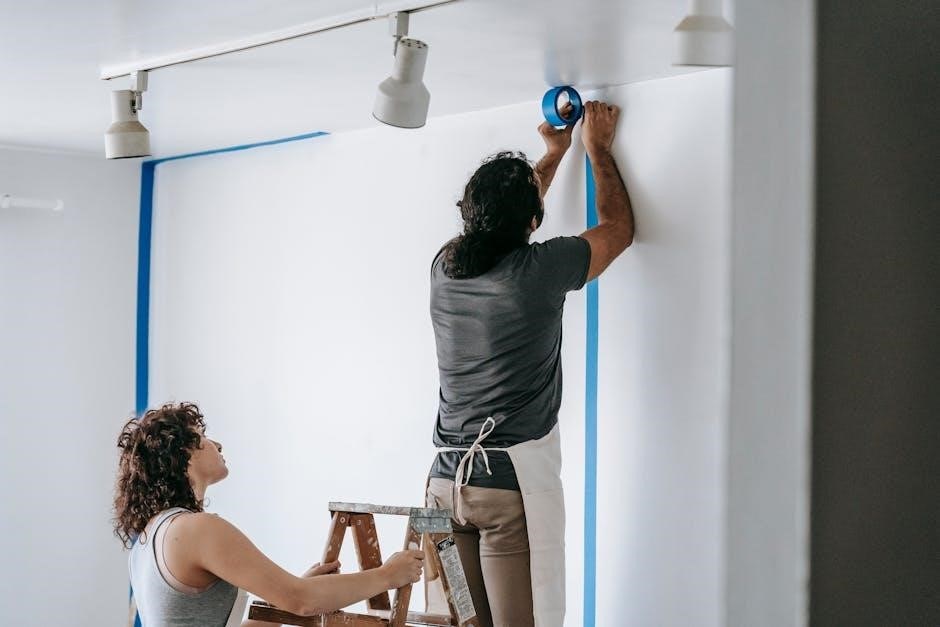Internalized homophobia refers to the acceptance of homophobic societal norms, leading to self-hatred and shame among LGBTQ+ individuals. It stems from societal prejudice and discriminatory cultural values, causing mental health struggles and strained relationships. Overcoming internalized homophobia is crucial for achieving self-acceptance and embracing one’s authentic identity.
What is Internalized Homophobia?
Internalized homophobia refers to the process by which individuals from the LGBTQ+ community absorb and internalize society’s negative attitudes, prejudices, and stereotypes about homosexuality. This phenomenon occurs when individuals are repeatedly exposed to homophobic messages, leading them to develop self-hatred, shame, and doubt about their sexual identity. It often manifests as a rejection of one’s true self, perpetuating feelings of inadequacy and fear of societal judgment. Internalized homophobia can stem from cultural norms, family values, and personal experiences, making it a deeply personal and complex issue to address. Understanding this concept is essential for fostering self-acceptance and overcoming its harmful effects.
The Impact of Societal Homophobia on Self-Perception
Societal homophobia profoundly shapes self-perception, fostering a toxic environment where LGBTQ+ individuals internalize negative stereotypes and prejudices. Growing up in a heteronormative world, many face discrimination, marginalization, and rejection, which can erode self-worth and lead to self-doubt. The constant exposure to homophobic messages perpetuates feelings of shame and inadequacy, making it difficult for individuals to embrace their true identities. This internalized hatred often manifests as self-criticism and anxiety, hindering personal growth and authentic expression. Recognizing the role of societal homophobia in shaping self-perception is crucial for addressing internalized homophobia and fostering a path toward self-acceptance and empowerment. By understanding these influences, individuals can begin to challenge and overcome harmful self-perceptions.
Why Addressing Internalized Homophobia is Crucial
Addressing internalized homophobia is essential for fostering emotional well-being and self-acceptance. Left unchallenged, it perpetuates self-hatred, mental health struggles, and strained relationships. By confronting these deeply rooted biases, individuals can break free from societal prejudice and embrace their authentic identities. Healing from internalized homophobia promotes resilience, self-love, and healthier connections with others. It also empowers individuals to challenge systemic homophobia, creating a more inclusive and accepting world. Overcoming internalized homophobia is not only a personal liberation but also a step toward collective progress, allowing LGBTQ+ individuals to thrive without the weight of internalized shame.

Understanding the Psychological Effects
Internalized homophobia has profound psychological effects, often leading to depression, anxiety, and low self-esteem. It can cause self-doubt and confusion about one’s sexual identity, hindering emotional well-being and personal growth.
Mental Health Consequences of Internalized Homophobia
Internalized homophobia can lead to severe mental health issues, including depression, anxiety, and low self-esteem. Many individuals experience self-doubt and confusion about their sexual identity, which can intensify feelings of alienation. The internalized shame often results in self-destructive behaviors and strained relationships. These psychological struggles may also contribute to social withdrawal and a lack of emotional well-being. Addressing these mental health consequences is essential for fostering resilience and promoting a healthier, more authentic sense of self. Recognizing these effects is the first step toward healing and embracing one’s true identity.
The Role of Shame and Self-Hatred in Mental Health
Shame and self-hatred are central to the mental health challenges posed by internalized homophobia. These emotions often arise from societal prejudice and personal experiences of discrimination, leading to a distorted self-image. Shame can manifest as self-blame, while self-hatred fosters negative self-perceptions. This toxic combination exacerbates mental health issues like depression and anxiety, hindering emotional well-being. Both shame and self-hatred create barriers to self-acceptance, making it difficult for individuals to form healthy relationships or embrace their identity. Addressing these feelings is crucial for healing, requiring a shift from self-criticism to self-compassion and understanding.
How Internalized Homophobia Affects Relationships
Internalized homophobia significantly impacts relationships by fostering self-doubt, fear of rejection, and trust issues. Individuals may struggle to form intimate connections due to feelings of shame or inadequacy, often projecting negative self-perceptions onto others. This can lead to difficulties in expressing emotions or feeling deserving of love. Romantic relationships may suffer as self-hatred and unresolved trauma create barriers to intimacy. Additionally, internalized homophobia can cause individuals to hide their true selves, leading to emotional distancing or self-sabotage. These patterns can strain relationships and prevent authentic connections. Addressing internalized homophobia is essential for building healthy, fulfilling relationships rooted in self-acceptance and mutual respect.

Recognizing the Signs of Internalized Homophobia
Signs include self-loathing, shame, and emotional repression, often rooted in societal prejudice. Individuals may exhibit self-doubt, fear of rejection, and difficulty accepting their true identity.
Common Manifestations of Internalized Homophobia
Internalized homophobia often manifests as self-hatred, shame, and emotional suppression. Individuals may experience self-doubt, fear of rejection, and difficulty accepting their sexual identity. They might deny their true feelings, leading to emotional turmoil and mental health struggles. Some people may exhibit self-destructive behaviors or struggle with intimacy, fearing judgment or rejection. Others may overly conform to societal norms or even participate in homophobic behaviors to mask their internal conflict. These manifestations can deeply impact personal relationships and overall well-being, highlighting the importance of addressing and overcoming these internalized beliefs.
Self-Doubt and Confusion About Sexual Identity
Internalized homophobia often manifests as self-doubt and confusion about one’s sexual identity. Individuals may question their orientation, feel ashamed of their desires, or struggle to reconcile their feelings with societal expectations. This internal conflict can lead to feelings of inadequacy and anxiety about being true to oneself. The fear of rejection and judgment, compounded by negative self-perceptions, can make it difficult to embrace one’s authentic identity. This confusion can also result in emotional turmoil, as individuals grapple with the mismatch between their true selves and the societal norms they’ve internalized. Addressing these feelings is essential for healing and self-acceptance.
Behavioral Patterns Linked to Internalized Homophobia
Internalized homophobia can lead to self-destructive behavioral patterns, such as self-sabotage, substance abuse, or self-harm, as individuals struggle to cope with internalized shame. Many may avoid LGBTQ+ communities or hide their true selves, fearing rejection or judgment. Others might overachieve to compensate for feelings of inadequacy or engage in risky behaviors to escape emotional pain. These behaviors often stem from a deep-seated belief that being LGBTQ+ is wrong, perpetuating cycles of self-hatred. Recognizing these patterns is crucial for healing, as they can hinder personal growth and relationships. Addressing these behaviors requires self-awareness, compassion, and a commitment to challenging harmful societal norms.

Exploring the Causes
Internalized homophobia arises from societal prejudice, cultural norms, and personal trauma, often rooted in family upbringing and exposure to homophobic environments, shaping self-perception and identity.
Societal and Cultural Influences on Homophobia
Societal and cultural norms play a significant role in fostering internalized homophobia. Growing up in a heteronormative world, many LGBTQ+ individuals are exposed to homophobic messages, reinforcing feelings of inadequacy. Media representation often marginalizes queer identities, perpetuating stereotypes and stigma. Cultural values, particularly in conservative or religious communities, may condemn same-sex attraction, leading to self-rejection. Institutionalized discrimination, such as anti-LGBTQ+ laws, further legitimizes prejudice. These external factors internalize shame, making it difficult for individuals to embrace their authentic selves. The pervasive nature of these influences highlights the need to address systemic homophobia to promote self-acceptance and mental well-being.
Personal Experiences and Trauma
Personal experiences and trauma significantly contribute to internalized homophobia, often stemming from bullying, rejection, or verbal abuse. Many individuals face homophobic remarks or exclusion, leading to feelings of shame and self-doubt. Traumatic events, such as family rejection or religious condemnation, intensify these emotions, causing internal conflict. For some, participation in homophobic behaviors before self-acceptance further embeds self-hatred. These experiences create a cycle of negativity, making it difficult to embrace one’s identity. Addressing these traumas is essential for healing, as they deeply influence self-perception and mental health. Recognizing the impact of personal trauma is a critical step toward overcoming internalized homophobia and fostering self-acceptance.
The Role of Family and Upbringing
The role of family and upbringing is pivotal in shaping internalized homophobia, as societal values are often first introduced within the home. Growing up in environments where homophobic beliefs are prevalent can lead to internalized shame and self-hatred. Negative reactions from family members, such as rejection or disapproval, can deeply impact an individual’s self-perception. Religious or cultural teachings that condemn homosexuality further exacerbate these feelings. Conversely, supportive and accepting families can foster resilience and self-acceptance. The influence of upbringing highlights the importance of addressing familial and cultural factors in overcoming internalized homophobia and promoting mental well-being for LGBTQ+ individuals.

Overcoming Shame and Self-Hatred
Overcoming shame and self-hatred involves acknowledging internalized homophobia and actively working toward self-acceptance. Embracing one’s authentic identity and seeking supportive communities can foster healing and personal growth.
The Importance of Self-Acceptance
Self-acceptance is vital for overcoming internalized homophobia, as it allows individuals to embrace their true selves without shame. By recognizing their inherent worth and rejecting societal prejudices, individuals can heal and grow. This process fosters resilience, enabling them to navigate a heteronormative world authentically. Self-acceptance is the foundation for building self-love and combating the internalized hatred rooted in societal homophobia. It empowers individuals to redefine their self-perception positively, leading to mental well-being and fulfilling relationships. Ultimately, self-acceptance is a liberating step toward living an authentic and joyful life, free from the burdens of internalized homophobia.
Reframing Negative Self-Perceptions
Reframing negative self-perceptions is essential for overcoming internalized homophobia. This process involves identifying and challenging harmful beliefs rooted in societal homophobia. By questioning the validity of these beliefs, individuals can replace them with positive, affirming thoughts. Self-compassion plays a key role in this transformation, allowing individuals to embrace their identity without judgment. Education about LGBTQ+ issues and exposure to affirming narratives can also help dismantle internalized shame. Reframing fosters a more positive self-image, enabling individuals to live authentically and break free from the cycle of self-hatred. This step is crucial for healing and building a healthier relationship with oneself and others.
Building Self-Compassion and Self-Love
Building self-compassion and self-love is a transformative process for overcoming internalized homophobia. It involves acknowledging and accepting one’s humanity, treating oneself with kindness, and challenging self-critical thoughts. Self-love becomes a powerful antidote to shame, fostering a deeper connection to one’s identity. Practices like mindfulness, journaling, and affirmations can help cultivate compassion. Surrounding oneself with supportive communities and role models who embody self-love further reinforces this journey. Embracing self-love allows individuals to reclaim their worth, move beyond societal conditioning, and live authentically. This process is gradual but profound, enabling individuals to replace self-hatred with acceptance and pride in who they are.

Strategies for Healing
Healing from internalized homophobia involves a combination of self-reflection, professional guidance, and community support. Techniques like mindfulness and self-care help rebuild self-worth and foster personal growth.
Seeking Professional Help and Therapy
Seeking professional help from licensed therapists or counselors is a crucial step in overcoming internalized homophobia. Mental health professionals can provide a safe, non-judgmental space to explore feelings of shame and self-hatred. Therapy can help individuals identify and challenge negative thought patterns rooted in societal homophobia. Techniques like cognitive-behavioral therapy (CBT) can be effective in reframing harmful self-perceptions. Additionally, therapists can offer guidance on building self-compassion and developing healthier coping mechanisms. Engaging in therapy allows individuals to process past traumas and societal influences that contribute to internalized homophobia. Professional support is vital for fostering personal growth and achieving lasting emotional well-being.
The Power of Community and Support Groups
Community and support groups play a vital role in helping individuals overcome internalized homophobia. Sharing experiences with others who face similar challenges fosters a sense of belonging and reduces feelings of isolation. Support groups provide a safe space to discuss struggles openly, allowing individuals to process shame and self-hatred. Connecting with others who understand the journey can empower individuals to embrace their authentic selves. These groups often offer practical advice, emotional support, and resources for personal growth. Engaging in community-building activities can also help individuals rebuild their sense of identity and self-worth, promoting a healthier and more positive outlook on life.
Practical Steps for Personal Growth
Overcoming internalized homophobia requires intentional steps toward self-acceptance and healing. Start by identifying and challenging negative self-perceptions rooted in societal homophobia. Practice self-compassion through affirmations and mindfulness to counteract self-hatred. Set boundaries with others who perpetuate harmful beliefs and seek environments that affirm your identity. Educate yourself about LGBTQ+ history and culture to rebuild pride and connection. Engage in activities that celebrate your authenticity, fostering resilience and confidence. These practical steps empower individuals to move beyond shame and embrace their true selves, paving the way for personal growth and liberation.
Maintaining Progress and Avoiding Setbacks
Maintaining progress involves regular self-reflection, awareness of triggers, and surrounding yourself with supportive communities. Setting realistic goals and practicing mindfulness can help prevent relapses and sustain growth.
Creating a Supportive Environment
Creating a supportive environment involves fostering acceptance and inclusivity, reducing exposure to homophobic influences, and promoting self-expression. Surround yourself with affirming communities, seek supportive relationships, and engage in open dialogues. Establish safe spaces where self-acceptance is encouraged, and minimize triggers that may reinforce internalized homophobia. Incorporate affirming literature, art, and media to counteract negative societal messages. Building a network of understanding individuals and professionals can provide ongoing encouragement and help sustain progress. By cultivating such an environment, individuals can more effectively navigate their journey toward self-acceptance and resilience against internalized homophobia.
Practicing Mindfulness and Self-Care
Practicing mindfulness and self-care is essential for healing from internalized homophobia. Mindfulness helps individuals become aware of harmful thought patterns and emotions without judgment, fostering self-compassion. Engaging in activities like meditation, journaling, or yoga can reduce stress and promote emotional balance. Self-care involves nurturing physical, emotional, and mental well-being through activities that bring joy and comfort. Setting boundaries, prioritizing rest, and seeking supportive relationships are also key. By consistently practicing mindfulness and self-care, individuals can create a foundation for long-term growth and resilience, helping to counteract the negative effects of internalized homophobia and fostering a healthier relationship with oneself.
Setting Realistic Goals for Continued Growth
Setting realistic goals is vital for sustained progress in overcoming internalized homophobia. Break down your journey into manageable steps, celebrating small achievements along the way. Identify specific areas for growth, such as challenging negative self-talk or building confidence in your identity. Regularly assess and adjust your goals to ensure they remain relevant and attainable. Surround yourself with supportive people who encourage your progress. Remember, healing is a gradual process, and patience with yourself is key. By setting clear, achievable goals, you create a roadmap for lasting self-acceptance and personal growth, fostering resilience and confidence in your authentic self.

Embracing Authenticity
Embracing authenticity means accepting oneself fully, free from societal expectations and internalized homophobia. It liberates individuals to live truthfully, fostering self-acceptance, resilience, and genuine happiness.
The Liberating Power of Self-Acceptance
Self-acceptance is the cornerstone of liberation from internalized homophobia. It empowers individuals to embrace their true selves, free from societal expectations and shame. By acknowledging and valuing their identity, people can break free from self-hatred and fostera deeper sense of self-worth. This liberation translates into improved mental health, stronger relationships, and a more authentic life. Overcoming internalized homophobia requires recognizing its roots in societal prejudice and actively challenging those beliefs. Through self-compassion and mindfulness, individuals can reframe negative self-perceptions and embrace their LGBTQ+ identity with pride. Self-acceptance is not just a personal victory but also a powerful step toward healing and living a fulfilling, genuine life.
Living Authentically in a Heteronormative World
Living authentically in a heteronormative world is a profound challenge for many LGBTQ+ individuals, as societal norms often perpetuate cisgender and heterosexual dominance. Internalized homophobia can make it difficult to embrace one’s true identity, leading to feelings of alienation and disconnection. However, living authentically requires courage to reject societal expectations and proudly assert one’s identity. This involves challenging internalized beliefs and embracing self-acceptance, even in the face of external judgment. By doing so, individuals can break free from the constraints of heteronormativity and live a life that aligns with their true selves. Authenticity fosters resilience and empowers individuals to thrive despite societal pressures, creating a path to self-liberation and fulfillment.
Celebrating LGBTQ+ Identity and Culture
Celebrating LGBTQ+ identity and culture is a powerful way to counteract the harmful effects of internalized homophobia. Embracing one’s identity fosters pride, resilience, and a sense of belonging. LGBTQ+ culture enriches society through art, literature, and shared experiences, highlighting the community’s contributions. Pride events and cultural celebrations provide spaces for self-expression and solidarity, helping individuals reclaim their identities with joy and confidence. By honoring LGBTQ+ heritage, individuals can challenge societal norms and promote inclusivity, creating a world where authenticity is celebrated. This celebration not only heals personal wounds but also inspires future generations to embrace their identities without shame, fostering a legacy of acceptance and empowerment.
